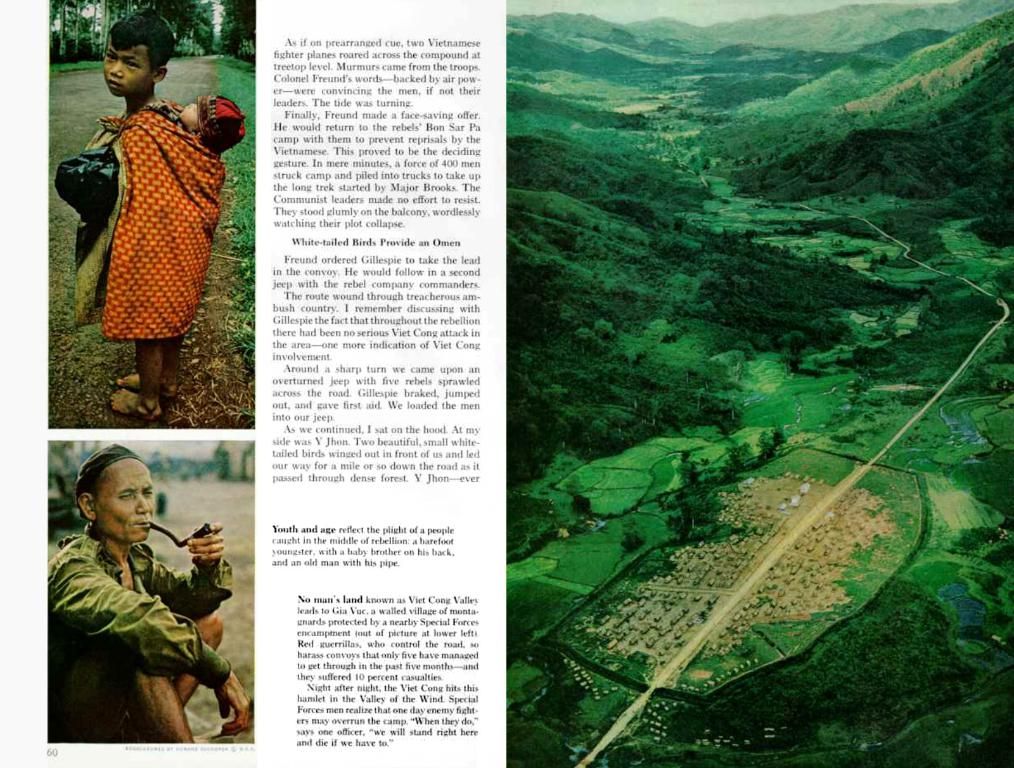Annual Effort to Enhance Summer Cleanliness in Dusseldorf Repeats
Summer Cleanliness Crusades in Düsseldorf, a Tradition Since 2011
Since 2011, Düsseldorf's summer cleanliness crusades have reigned supreme. With snappy slogans plastered on trash cans and promo teams in action since 2016 during weekends, the city aims to educate citizens about proper trash disposal. During a press conference on July 18, Mayor Dr. Stephan Keller reinforced, "That's why I launched a cleanliness offensive together with the relevant departments and Awista at the end of 2020, and since then, many projects have been implemented that are now paying off."
Urging participation in events like the "Trash-Free Day" or the RhineCleanUp on September 9, Keller also shouted out the voluntary efforts of the "Clean Rhine Park" group in Golzheim. Although not invited, group founding member Bernadette Niehaus appreciated the mention but shared her concerns about the city's initiatives. For weeks, she's been trying to get employees from the gardening and public order offices to join her in identifying problem areas. While Awista faithfully empties trash cans and clears obvious trash, Niehaus comments that no thorough cleaning takes place, especially along the Rhine embankment, with trash piling up, and nobody taking responsibility. Negligible litter like cigarette butts, harmful to the environment, is allegedly overlooked by city employees in parks and along the Rhine. Despite her group's weekly trash collection efforts, Niehaus claims the city's cleanliness drives have failed to make a significant impact.
Instead of sending promo teams through parks and along the Rhine with flyers and free eco-friendly plastic trash bags, deploying public order officers to fine litterers might prove more effective. The penalty catalog for the enforcement of § 2 of Düsseldorf's Street Ordinance clearly states fines for failing to remove pollutants from streets, paths, squares, and facilities:
- Casually tossing cigarette butts: 50 Euro
- Throwing away food, leftovers, gum, cans, bottles, tetra packs, food wrappers like French fry boxes, pizza boxes, etc.: 50 Euro
- Emptying ashtrays into the gutter: 75 Euro
- Improperly disposing of dog waste: 100 Euro
- Placing household waste in or on public trash bins: 100 Euro
Environment and Mobility Designee Jochen Kral and Mayor Keller revealed the 2023 campaign, with Kral explaining, "The promo teams appeal to those seeking recreation to also take their trash with them or dispose of it in the numerous available containers." Britta Zur, the new head of the public order office, might also enlist her team in Düsseldorf's cleanliness offensive in the future.
Whether a sticker on trash bins will inspire people to use them remains to be seen, as many seem to disregard the slogans.
** Extra Large Trash Bins in Popular Spots**
100 permanently installed year-round waste bins in green spaces and "city squares", such as Hofgarten, Rheinpark, Zoopark, and Schillerplatz and Hermannplatz, have been replaced with larger 100-liter capacity models. An additional 100 bins are planned for installation to meet the growing demand for waste disposal.
** Four Full-Time Staff but Hundreds of Volunteers!**
Since autumn 2022, the "Green Deployment Team" with four employees, a truck, and various equipment has been regularly active in popular green spaces in the city center and surrounding areas, picking up trash and emptying bins. They're also called in for special operations to remove significant damage caused by vandalism in green spaces. Despite their best efforts, much waste is still collected by volunteers. While there were only 23 waste collection actions in 2018 by companies, private groups, and individuals, this number swelled to 125 actions in 2023. Volunteers receive waste bags, gloves, loanable garbage grabbers, and hangers to distinguish their bags from illegally dumped trash. "I'm about to join a volunteer waste collection action" is emblazoned on the bags, along with the city and Awista logos and contact information for the Cleanliness Service telephone.
Those interested in a volunteer waste collection action, have suggestions, or want to report pollution can contact the Cleanliness Service telephone in the Environmental and Consumer Protection Agency. The telephone is open from Monday to Friday from 8 am to 4 pm at 0211-8925050 or by email at [email protected]. Reports can also be submitted via the "Düsseldorf stays clean" app. Links to this app and further information can be found at www.duesseldorf.de/stadtsauberkeit.
Enrichment Insights:While the specific effectiveness of fines for littering in Düsseldorf is not explicitly documented, their impact depends on factors like visibility, enforcement, and community support. Successful cleanliness campaigns often combine enforcement, education, and community participation, addressing both behavior and root causes to achieve sustainable results. In nearby regions like the Coesfeld district in the Münsterland region, smart city technologies like litter prevention and monitoring have been introduced to augment traditional methods.
- The Environmental and Mobility Designee Jochen Kral suggested that people should not only take advantage of the numerous waste bins available in popular spots but also be mindful of their environmental footprint by reducing litter.
- Despite the efforts of the "Green Deployment Team" and the increased number of large trash bins in city parks, there is still a need for volunteers to help with waste collection, indicating a continued lack of cleanliness in outdoor-living areas.
- In the realm of home-and-garden maintenance, the city could consider implementing practices from the environmental sciences, such as implementing eco-friendly waste management solutions, to improve cleanliness and contribute positively to the environment.




